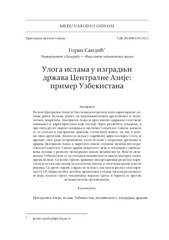Приказ основних података о документу
Улога ислама у изградњи држава Централне Азије: пример Узбекистана
The Role of Islam in State-Building of Central Asian States: A Case Study of Uzbekistan
| dc.creator | Sandić, Goran | |
| dc.date.accessioned | 2023-10-09T11:18:50Z | |
| dc.date.available | 2023-10-09T11:18:50Z | |
| dc.date.issued | 2022 | |
| dc.identifier.issn | 1820-6700 | |
| dc.identifier.uri | http://rfpn.fpn.bg.ac.rs/handle/123456789/1036 | |
| dc.description.abstract | Регион Централне Азије је био номадски регион који карактерише долазак раног ислама, једног од најдинамичнијих друштвених и политичких покретача. Централна Азија је кроз векове задржала сопствену динамику и карактеристике које опстају. Кроз различита освајања, а пре свега руско царско освајање и настанак Совјетског Савеза, мењале су се спољне и унутрашње границе, политички живот, па чак и језици ових друштава. Једино је ислам у одређеној мери опстајао. Стога је предмет овог рада истраживање улоге ислама у изградњи друштава и држава Централне Азије, а нарочито након стицања независности распадом Совјетског Савеза крајем двадесетог века и такозваног оживљавања ислама у региону непосредно након независности. Власти независног Узбекистана су од стицања независности имале двострук однос према исламу. Са једне стране, државна инкорпорација религије користила је ислам као оквир за политичку акцију и легитимизацију власти режима. Са друге стране, управо се та власт, настала и расла у секуларизму СССР, бринула због могућег превеликог утицаја (неконтролисаног) ислама, водила строгу евиденцију верских група и борила се против исламистичких организација. | sr |
| dc.description.abstract | Central Asia was a nomadic region which experienced an early arrival of Islam, one of the most dynamic social and political drivers. Throughout the centuries, Central Asia has retained its own dynamics and characteristics that persist today. Through various conquests, primarily the Russian imperial conquest and the creation of the Soviet Union, the external and internal borders, political life, and even the languages of these societies changed. Only Islam survived to a certain extent. Therefore, the subject of this paper is the research of the role of Islam in the construction newly independent states in Central Asia after the collapse of the Soviet Union at the end of the twentieth century and the so-called revival of Islam in the region immediately after independence. The authorities of independent Uzbekistan have had a dual attitude towards Islam since independence. On the one hand, the state incorporation of religion used Islam as a framework for political action and legitimization of the regime’s power. On the other hand, this very government, which arose and grew in the secularism of the USSR, worried about the possible excessive influence of (uncontrolled) Islam, kept strict records of religious groups and fought against Islamist organizations. | sr |
| dc.language.iso | sr | sr |
| dc.publisher | Beograd : Fakultet političkih nauka | sr |
| dc.rights | openAccess | sr |
| dc.rights.uri | https://creativecommons.org/licenses/by/4.0/ | |
| dc.source | Godišnjak Fakulteta političkih nauka | sr |
| dc.subject | Централна Азија | sr |
| dc.subject | ислам | sr |
| dc.subject | Узбекистан | sr |
| dc.subject | независност | sr |
| dc.subject | изградња државе | sr |
| dc.subject | Central Asia | sr |
| dc.subject | Islam | sr |
| dc.subject | Uzbekistan | sr |
| dc.subject | Independence | sr |
| dc.subject | Identity | sr |
| dc.title | Улога ислама у изградњи држава Централне Азије: пример Узбекистана | sr |
| dc.title | The Role of Islam in State-Building of Central Asian States: A Case Study of Uzbekistan | sr |
| dc.type | article | sr |
| dc.rights.license | BY | sr |
| dc.citation.epage | 110 | |
| dc.citation.issue | 28 | |
| dc.citation.rank | M51 | |
| dc.citation.spage | 93 | |
| dc.identifier.fulltext | http://rfpn.fpn.bg.ac.rs/bitstream/id/2787/fulltext.pdf | |
| dc.identifier.rcub | https://hdl.handle.net/21.15107/rcub_rfpn_1036 | |
| dc.type.version | publishedVersion | sr |

